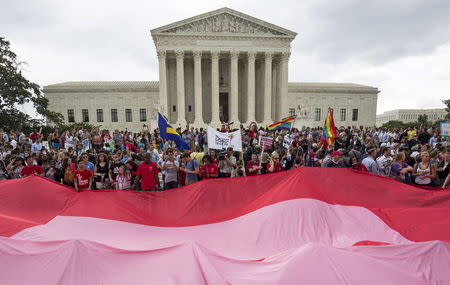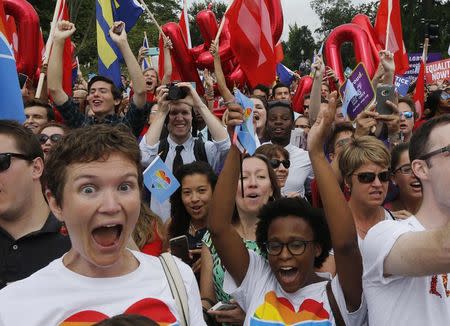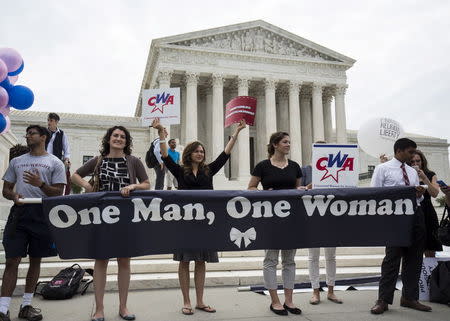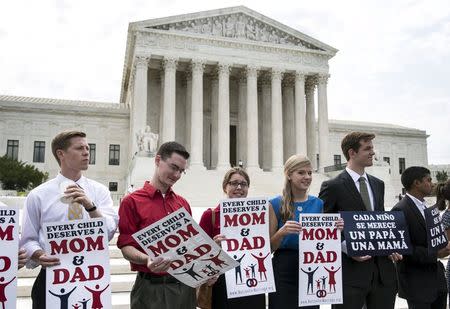Celebration and bittersweet memories outside U.S. Supreme Court
By Megan Cassella WASHINGTON (Reuters) - Surrounded by a sea of supporters on the sidewalk outside the white marble facade of the U.S. Supreme Court on Friday, James Obergefell remembered a man who was not able to share his moment of triumph. "I know in my heart John is here with me today," Obergefell told hundreds of gay rights supporters after the high court declared same-sex marriage legal in all 50 states. Obergefell, the lead plaintiff in the case that led to the landmark ruling, was referring to his late husband John Arthur. Obergefell sued Ohio, which banned gay marriage, after the state refused to acknowledge his marriage to Arthur on Arthur's death certificate. They had married in Maryland, a state that allowed gay marriages, just months before Arthur died in 2013 after battling amyotrophic lateral sclerosis, also known as Lou Gehrig’s disease. After the ruling, Obergefell received a congratulatory call from President Barack Obama. "We're really proud of you," Obama told him. "Your leadership on this, you know, has changed the country." A jubilant crowd chanting "Love has won" enveloped Obergefell, his lawyers and fellow plaintiffs as they walked down the steps of the court following the decision. Supporters had begun gathering hours before, holding signs under blue skies that read, "Be proud," "Be you," and "It shouldn't have to be legalized in the first place." In time, they spread across the courthouse steps and spilled into the street in celebration, letting out whoops and shouts of "U-S-A" even as the sky turned gray, police battled to keep people on the sidewalk and the Gay Men's Chorus of Washington, D.C., broke out in song. "As a gay American, it's a very special moment for all of us," said Lynn Fussell of Arlington, Virginia, whose shirt read "MIGHTY QUEER." A smaller group protesting gay marriage gathered on the sidewalk earlier, holding signs reading, "Every child deserves a mom and a dad," but it dissipated quickly after the decision. Outside the courthouse, Jennifer Marshall of the Heritage Foundation conservative think tank said the case "won't settle the marriage debate any more than Roe v. Wade settled the abortion debate," referring to the court's 1973 ruling legalizing abortion. There were other celebrations in various cities. In San Francisco's historic gay district, people held a large rainbow flag on the sidewalk on Castro Street, raising it over their heads as passersby smiled and ducked under. "I cried when I heard, and I don't cry," said Gene Lotito, 50, as he walked across a rainbow-colored crosswalk. "I never thought this would happen in my lifetime. I finally feel like a citizen." (Reporting by Megan Cassella and Bill Trott in Washington and Emmett Berg in San Francisco; Editing by Will Dunham)







